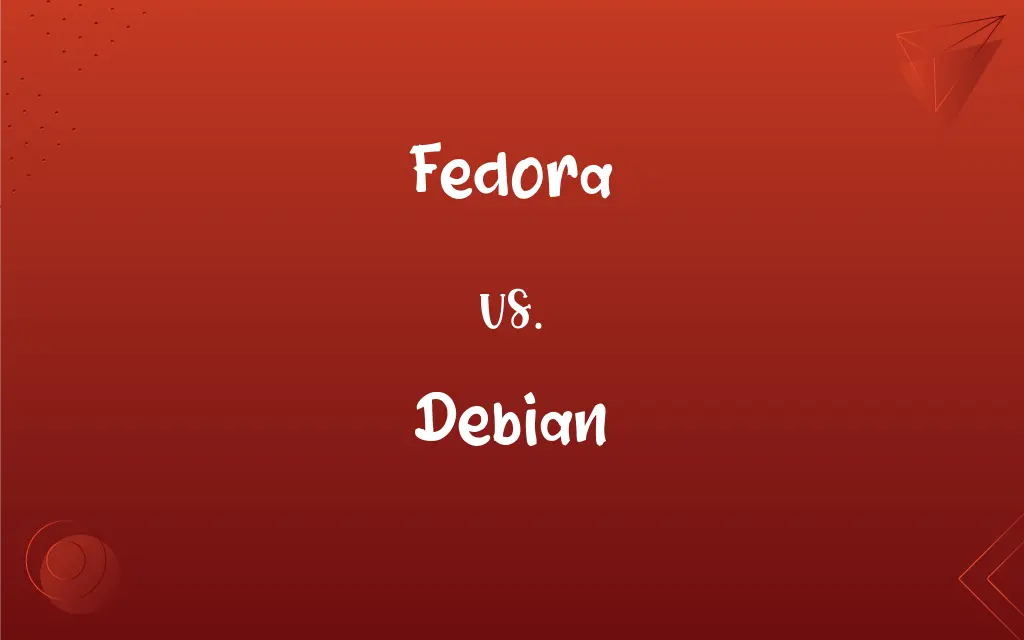Fedora vs. Debian: What's the Difference?
Edited by Harlon Moss || By Janet White || Published on February 10, 2024
Fedora is a cutting-edge Linux distribution with the latest software, while Debian is known for its stability and extensive software repositories.

Key Differences
Fedora, sponsored by Red Hat, is a Linux distribution known for its innovation and incorporation of the latest software. Debian, on the other hand, focuses on stability and thorough testing of software before release, making it a preferred choice for servers and enterprises.
Fedora often serves as a testing ground for new features that may later be included in Red Hat Enterprise Linux. Debian, with its strong commitment to free software principles, offers a vast array of packages maintained by a dedicated community.
The release cycle of Fedora is relatively short, with new versions released approximately every six months. In contrast, Debian has a more unpredictable release cycle, prioritizing stability over a set schedule.
Fedora uses the RPM package management system, facilitating easy installation and management of software. Debian uses the APT and dpkg package management systems, renowned for their reliability and efficiency.
In terms of user-friendliness, Fedora often appeals to those who prefer the latest technology and features. Debian, while user-friendly, is often favored by users who require a solid, reliable system over cutting-edge features.
ADVERTISEMENT
Comparison Chart
Sponsorship
Sponsored by Red Hat
Community-driven, with strong free software ethos
Software Philosophy
Cutting-edge, latest software
Stability, extensively tested software
Release Cycle
Approximately every 6 months
More flexible, prioritizes stability
Package Management
RPM
APT and dpkg
Target Audience
Enthusiasts, developers
Servers, enterprises, stability-focused users
ADVERTISEMENT
Fedora and Debian Definitions
Fedora
Fedora is a Linux distribution known for featuring the latest software and technologies.
I installed Fedora to experiment with the newest developments in Linux.
Debian
Debian uses the APT package management system, ensuring reliable software installations.
With Debian's APT system, software management is efficient and reliable.
Fedora
Fedora serves as a testing ground for Red Hat Enterprise Linux.
Many features in Fedora eventually make their way into Red Hat's commercial offerings.
Debian
Debian's release cycle prioritizes stability over a fixed schedule.
Debian releases a new version when it's deemed stable, not according to a set timeline.
Fedora
Fedora uses RPM package management for software installation and updates.
Installing software on Fedora is streamlined thanks to its RPM system.
Debian
Debian is a popular, stable Linux distribution with a focus on free software.
I chose Debian for my server due to its reputation for stability.
Fedora
Fedora releases new versions frequently, offering the latest Linux features.
Fedora's frequent updates keep my system up-to-date with the latest software.
Debian
Debian is known for its vast and well-maintained software repositories.
Debian's extensive repositories make it easy to find almost any software I need.
Fedora
Fedora has a strong focus on open-source principles and community involvement.
The Fedora Project encourages community contributions to improve its distribution.
Debian
Debian is a community-driven project, emphasizing collaboration and free software.
The Debian community plays a crucial role in its development and support.
Fedora
A soft felt hat with a fairly low crown creased lengthwise and a brim that can be turned up or down.
Fedora
A felt hat with a fairly low, creased crown with a brim that can be turned up or down.
Fedora
A soft felt hat with a crown creased lengthwise.
Fedora
Felt hat with a creased crown
FAQs
What is Fedora?
Fedora is a cutting-edge Linux distribution sponsored by Red Hat.
What distinguishes Debian from Fedora?
Debian is known for its stability and extensive software repositories, unlike Fedora's focus on the latest software.
Can I use Fedora for a server?
Yes, but Fedora's rapid update cycle might suit development environments better than stable servers.
What package manager does Fedora use?
Fedora uses the RPM package management system.
Is Fedora good for developers?
Yes, Fedora is popular among developers due to its latest features and technologies.
Does Debian have a lot of software available?
Yes, Debian has one of the largest software repositories among Linux distributions.
Is Fedora suitable for beginners?
Fedora can be used by beginners, but it's more geared towards those familiar with Linux.
How often is Debian updated?
Debian updates are not on a fixed schedule but are released when ready, prioritizing stability.
What is Debian's policy on non-free software?
Debian prioritizes free software but makes non-free software available in separate repositories.
How is Debian's security?
Debian has a strong focus on security and stability.
How user-friendly is Debian?
Debian is user-friendly but may require more Linux familiarity compared to some other distributions.
What is the default desktop environment in Fedora?
Fedora typically uses GNOME as its default desktop environment.
Does Debian have a strong community?
Yes, Debian has a large and active community of developers and users.
What support options are available for Fedora?
Fedora offers community support through forums, mailing lists, and documentation.
Does Debian support multiple architectures?
Yes, Debian supports a wide range of hardware architectures.
Is Debian good for desktop use?
Yes, Debian is versatile and can be used for both desktop and server environments.
Are Fedora releases stable?
Fedora releases are stable but focus more on integrating the latest technologies.
Can I contribute to the Fedora project?
Yes, Fedora encourages contributions from its user community.
Is Fedora free to use?
Yes, Fedora is a free and open-source Linux distribution.
Can I use Debian for programming?
Yes, Debian's stable and comprehensive environment makes it suitable for programming.
About Author
Written by
Janet WhiteJanet White has been an esteemed writer and blogger for Difference Wiki. Holding a Master's degree in Science and Medical Journalism from the prestigious Boston University, she has consistently demonstrated her expertise and passion for her field. When she's not immersed in her work, Janet relishes her time exercising, delving into a good book, and cherishing moments with friends and family.
Edited by
Harlon MossHarlon is a seasoned quality moderator and accomplished content writer for Difference Wiki. An alumnus of the prestigious University of California, he earned his degree in Computer Science. Leveraging his academic background, Harlon brings a meticulous and informed perspective to his work, ensuring content accuracy and excellence.






































































